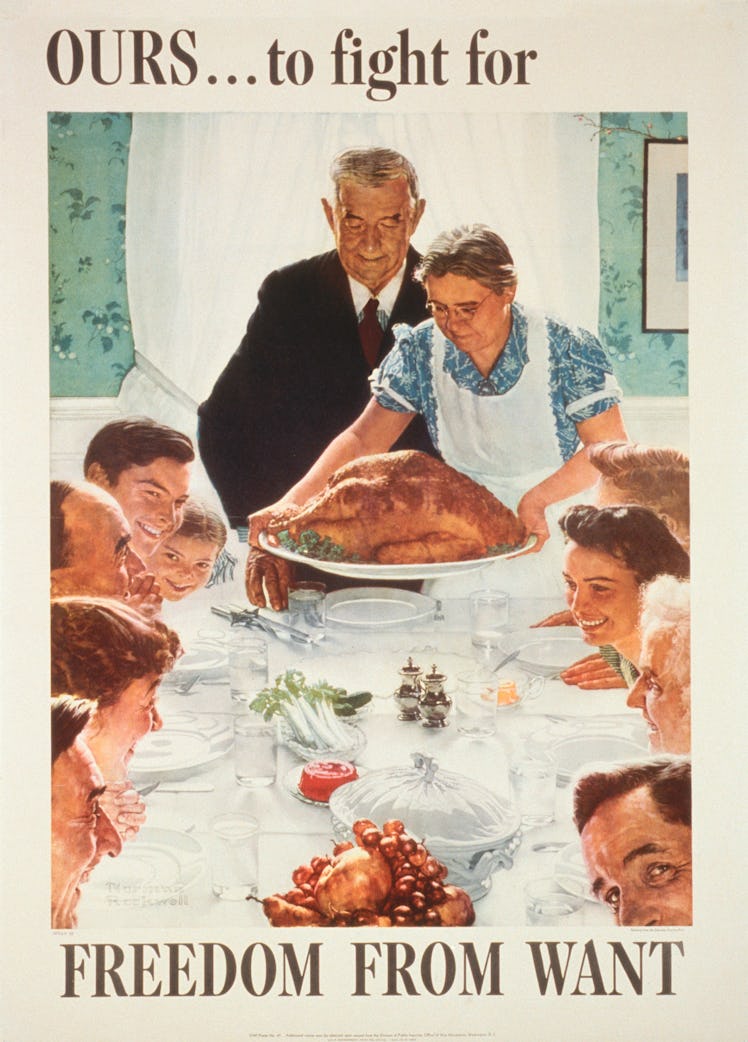Thanksgiving Is Here For Hard Talks And Revolutionary Thinking
This year, lean in to the tension.

In 2016, my wife and I developed a Thanksgiving codeword, a phrase that would allow us to escape should one of our relatives start talking politics. We were thankful we never had to use it. The months rolled on and we spent Christmas, Easter, and an extended vacation with our relatives. Yet, for some reason, despite the worsening political climate, we didn’t feel we needed the codeword during those gatherings. Yet. Still, Thanksgiving always looms with a palpable dread. Because unlike all the other family occasions, Thanksgiving is the holiday where sh*t gets real. And there’s good reason for that.
The idyllic Norman Rockwell Thanksgiving depicted in his 1943 painting “Freedom from Want“ hasn’t existed since the 1960s. During the middle of that politically tumultuous decade, and the ‘70s that followed, families were being called home to long supper tables from radically different communities. They brought their ideologies and passions with them. It would make sense that a political friction between right and left might cause dust-ups while the gravy was passed. After all, the war in Vietnam was uncovering sensitive divisions in many American households.
For proof of this connection look no further than Arlo Guthrie’s great protest story-song “Alice’s Restaurant Massacre,” an epic tale set around the repercussions of a Thanksgiving meal. Every year since I was a kid, I’ve listened and sung along to the hilarious 18-minute and 30-second track against authority and war, and continue to do so with my own kids.
What it tells me: Unlike the all the other family occasions, Thanksgiving is the holiday where shit gets real.
It was also during the ’60s that the American Indian Movement was picking up steam. The cultural veil over the historic mistreatment of the Native Americans wasn’t so much lifted as much as it was torn to pieces. While Americans feted the cooperation of the natives and settlers, it was becoming harder to not acknowledge that we’d screwed our generous neighbors good since 1621. For many, the construction paper pilgrim hats and cornucopias began to lose their luster. For many more, rank cynicism set in.
You can’t look at all this and fail to agree that Thanksgiving is uniquely primed for conflict. And it’s the day’s activities or lack thereof, that can set the tensions off.
Unlike most other family holidays, Thanksgiving lacks a central ritual that distracts from conflict. Sure, there’s the meal, but that just puts the tensions elbow-to-elbow and throws wine on the inhibitions. Beyond that, there’s milling around, more drinking, football watching, and ample time for chatter that strays beyond friendly anecdotes.
And what is there to talk about? Considering Thanksgiving comes just weeks after election results are tallied, political wounds and triumphs are uniquely fresh. That makes it very easy to fall into an “I can’t believe people voted for …” diatribe, which never ends well.
Add to all of this that there are no religious ceremonies about sacrifice and goodwill. There are no distracting gifts, egg hunts, or fireworks. It’s simply a bunch of lubed-up folks, crammed in a house, thinking of something to say.
And that doesn’t even factor in the stress of what Thanksgiving portends: a month of holiday consumption that will stretch the psyche and deplete the family bank accounts. Who wouldn’t cry when Aunt Mary drops the Pecan pie?
So my wife and I are bringing back the codeword. We’re also bringing the dessert and with it an understanding that Thanksgiving requires more effort for civility. Don’t get me wrong, we also bring a deep well of gratitude that we love our family enough to be with them on the auspicious day of thanks. And should we waddle off my sister-in-law’s stoop, slightly buzzed, laden with leftovers, having not uttered our codeword for another year, we will return home with plenty of gratitude, too.
This article was originally published on